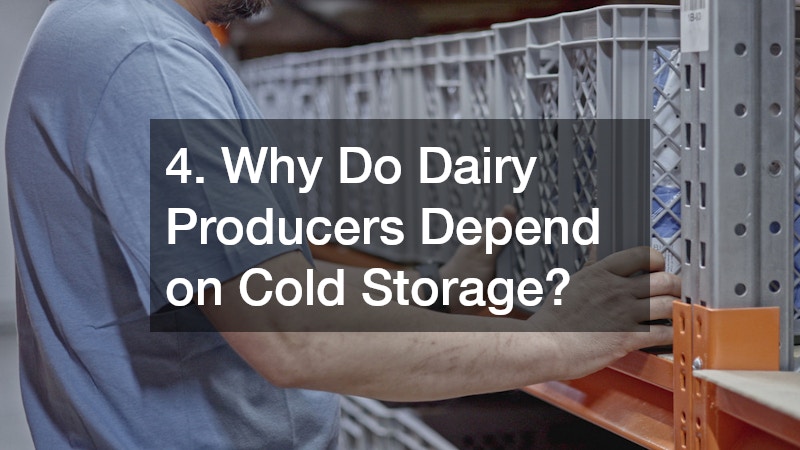This article explores the various types of businesses that require cold storage facilities and delves into why these setups are essential for their success. Cold storage plays a critical role in maintaining product quality, compliance with regulations, and overall business efficiency. Continue reading to learn more about the importance of a cold storage facility.
1. Why Do Food Production Companies Require Cold Storage?
1.1. Prolonging Shelf Life
Cold storage helps in extending the shelf life of perishable food items, ensuring they remain fresh for longer durations. Perishable goods, such as fruits and vegetables, can deteriorate quickly without adequate refrigeration, leading to significant waste and financial loss.
By utilizing cold storage, food production companies can better manage inventory and prevent spoilage. This method not only preserves the quality of the produce but also contributes to more sustainable practices by reducing waste generation.
For instance, cold storage can control ethylene emissions from ripening fruits, thus slowing down the ripening process. Consequently, this technology allows producers to supply fresh produce to markets, thus maintaining customer satisfaction and loyalty.
1.2. Ensuring Food Safety Standards
Food safety standards are stringent across the globe, necessitating proper storage solutions within the supply chain. Cold storage facilities play an integral role in helping companies adhere to these regulations, preventing the growth of harmful bacteria in food products.
To meet the standards set by bodies such as the FDA in the United States, companies need precise temperature controls available only through cold storage solutions. These facilities help minimize health risks by inhibiting microbial growth in food items, thereby ensuring consumer safety.
Additionally, regular temperature monitoring and data logging can provide traceability and accountability, vital for regulatory compliance. This systematic approach assists companies in maintaining high-quality products while reducing regulatory penalties for non-compliance.
2. How Is Cold Storage Beneficial for Pharmaceutical Companies?
2.1. Preserving Temperature-Sensitive Medications
Many pharmaceutical products, including vaccines and biologics, require stringent temperature controls for efficacy. Cold storage facilities are crucial in maintaining the stability and effectiveness of these critical medications.
Temperature-sensitive drugs that are not adequately stored can lose their potency and become harmful. By using cold storage, pharmaceutical companies can preserve the quality and efficacy of their products, ensuring optimal patient outcomes.
Implementing cold chain logistics also supports global health initiatives by ensuring the distribution of potent vaccines to remote regions. As a result, cold storage technology becomes a pivotal aspect in the successful delivery of life-saving medications worldwide.
2.2. Adhering to Regulatory Compliance
Regulatory bodies impose strict guidelines on the storage conditions of pharmaceutical products to prevent adulteration and degradation. Cold storage provides the precise temperature controls needed for compliance with regulations such as the Good Distribution Practices (GDP).
By ensuring strict compliance with regulatory standards, pharmaceutical companies avoid the risk of product recalls and associated financial losses. Such compliance not only ensures the safety and well-being of consumers but also upholds the reputation of manufacturers in the industry.
Cold storage facilities enable comprehensive monitoring and reporting, essential for any audit by regulatory agencies. This thorough documentation process ensures transparency and accountability within the pharmaceutical supply chain.
3. What Role Does Cold Storage Play in the Floral Industry?
3.1. Extending the Lifespan of Fresh Flowers
The floral industry relies heavily on cold storage to keep flowers fresh for a longer period, essential for both wholesale and retail purposes. By lowering the ambient temperature, cold storage facilities slow down the metabolic processes in plants, maintaining their aesthetic appeal.
Fresh-cut flowers have a limited post-harvest life and are highly susceptible to wilting and dehydration. Cold storage alleviates these issues, ensuring the flowers reach consumers in pristine condition.
Floral businesses utilizing cold storage can offer a wider variety of fresh flowers, even those that are not locally in season. This capability enhances market competitiveness and customer satisfaction by providing a diverse product range throughout the year.
3.2. Managing Supply Chain Demands
The floral industry often faces variability in supply and demand, influenced by seasonal trends and events. Cold storage helps businesses manage these fluctuations efficiently by allowing them to store surplus stock without quality deterioration.
Additionally, the ability to store large quantities of flowers provides flexibility in meeting sudden demand spikes, such as during holidays or special occasions. This adaptability can lead to increased sales and improved business resilience during peak times.
Logistical challenges, such as transportation delays, can also be mitigated with the use of cold storage. As flowers are transported from one region to another, cold storage ensures they remain fresh and vibrant until they reach their final destination.
4. Why Do Dairy Producers Depend on Cold Storage?
4.1. Maintaining Product Quality
Dairy products are highly perishable and require impeccable storage conditions to maintain freshness and safety. Cold storage minimizes bacterial growth in milk and its byproducts, ensuring they remain suitable for consumption.
Dairy producers can avoid delivering spoiled or off-tasting products to the market by leveraging advanced refrigeration solutions. This preservation of product quality fosters consumer trust and brand loyalty.
In addition to maintaining product safety, proper cold storage prolongs the saleable life of products like cheese, butter, and yogurt. This capability enables dairy businesses to optimize production cycles based on demand, reducing unnecessary waste.
4.2. Reducing Waste Through Proper Storage
Wastage poses a significant issue in the dairy industry due to the rapid perishability of its products. Cold storage facilities play a crucial role in maintaining optimal conditions that reduce spoilage and waste.
By efficiently managing inventory and storage conditions, dairy producers can minimize losses and improve supply chain efficiency. This waste reduction not only boosts profitability but also aligns with sustainable practices.
Additionally, cold storage allows for better coordination with distributors, ensuring timely replenishment and distribution. This synchronization helps maintain a steady availability of fresh products in retail environments while minimizing overproduction.


